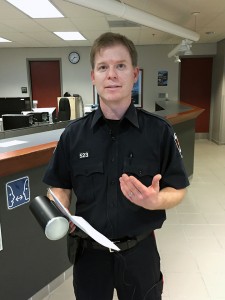Radar testing procedures questioned

Const. Andrew Drouillard addresses the media about radar testing at Windsor Police headquarters, Feb. 3.
There could be inconsistencies in police radar testing, but changes can’t be made unless people contest their traffic tickets.
A January report from CBC News claims most police organizations use a tuning fork test in order to test their radar apparatus. By tapping the two-pronged device against a non-metallic object, it vibrates at a specific speed. The radar can then be calibrated by ensuring the reading on the device matches the speed of the fork.
However, not all police organizations use this method, including the Ontario Provincial Police which stopped using tuning forks more than 10 years ago.
Off the Hook Paralegal owner Walter Martin said while radars have internal tests which check the circuitry of the device, only a tuning fork can properly test the radar’s antenna.
“Without the antenna working properly or ensuring the antenna is working properly, none of your readings should be allowed,” said Martin, who has taken tickets to court for the past four years.
Prior to starting Off the Hook, Martin was an officer with the Windsor Police Service working in the traffic enforcement division and later as an instructor.
Even though the CBC report has raised questions about the validity of millions of tickets, Martin said he does not foresee a return to tuning fork testing unless a large majority of people start calling for change.
“The only way this is going to change is if there’s enough noise about it and the government says, ‘no, we better start doing these tuning forks again,’” said Martin.
He said it is likely there won’t be a large majority because often people do not want to go to court for their ticket. Either they don’t want to admit to having a ticket or have concerns over higher insurance rates so instead they just pay the fine.
“Everybody that gets a ticket, they want to have a trial … but they’re scared to have the trial,” said Martin.
According to Martin, when the forks were phased out, they were told it was a cost-saving measure because if the fork became damaged, it can be expensive to replace it.
Martin added not using tuning forks in some jurisdictions also made it easier for officers to testify in court. This is because they would only have to discuss performing the basic, internal radar test and describe the traffic incident.
OTD Ticket Defenders owner Ron Harper said in court, those contesting their ticket often would have little defence due to absolute liability. He said in a court room all the Crown has to do is read off when and where the person was driving their car, then show the traffic ticket and there would be a conviction. In addition, the Crown may ask the officer if an internal radar check was performed before and after their shift, but often do not ask specifically about the tuning fork test.
“They’re (the judge) going to simply make a decision based on the best evidence they have which is whether or not it is a legitimate conviction,” said Harper.
However, following the release of the CBC report, Harper said the tickets should be challenged and it will be up to the Crown to defend the ticket.
“I think one of the things that the Crown has to do is they need to satisfy everyone that they’ve done everything possible … and if you’re not doing so, yes they should be challenged,” said Harper.
Before the report was released, Windsor Police said they did not have tickets contested based on radar testing, even though the organization does not use the tuning fork test.
Const. Andrew Drouillard said they do not perform the test because the manufacturer, Decatur, said the internal test is enough.
“If an officer does this calibration test at the beginning of his shift and at the end of his shift, this will have been deemed to have been sufficient knowing that the device was working properly,” said Drouillard.
The radar used, the Genesis VersaPak, also performs automatic checks of its systems in addition to the required tests at the beginning and end of an officer’s shift.
But even with manufacturer and police support of the internal testing system, both Harper and Martin said Windsor Police along with other organizations across the country should return to using tuning fork tests. Harper added this is due to accuracy and efficiency.
“It’s not a challenging test to do at all, said Harper.
“It takes seconds and we know that it’s more certain than any other test. Certainly far more certain than the internal calibration test.”
In addition to Windsor Police and the OPP, the CBC investigation also found the Regina Police Service do not use tuning forks but they are the minority. The RCMP as well as U.S. police forces require this method be used when testing radar.


